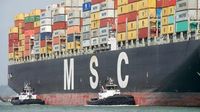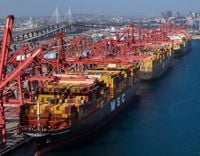The Mediterranean Shipping Company (MSC) has made history by becoming the first global container carrier to operate a fleet of 900 vessels. This remarkable milestone was celebrated with the delivery of the LNG-powered MSC GERMANY, a state-of-the-art 16,000 TEU "maxi-neo-panamax" containership. The MSC GERMANY is the fifth unit in a series of twelve sister ships ordered from a Chinese shipyard in October 2022, marking a significant achievement for the company.
According to Alphaliner, a leading liner industry analyst, MSC's current fleet comprises 609 owned vessels and 291 chartered ships. This extensive fleet allows MSC to maintain a total capacity of approximately 6.47 million TEU, which puts them nearly one million TEU slots ahead of their closest competitor, Maersk. The company’s ambitious growth strategy could see its fleet expand to 1,000 ships in the coming years, with 132 vessels currently on firm order.
The MSC GERMANY's delivery comes at a time when the container shipping market is experiencing unprecedented volatility, often referred to as "tariff madness." Industry experts predict that this chaotic environment will lead to a wave of renegotiations for ocean shipping contracts, as companies grapple with fluctuating rates and minimum quantity requirements. The situation is further complicated by the ongoing challenges in global supply chains, which have been exacerbated by the COVID-19 pandemic and geopolitical tensions.
MSC's fleet expansion is not just about numbers; it reflects the company's strategic vision to enhance its operational capabilities and improve service delivery amid rising demand for shipping services. The MSC Group, which also includes subsidiaries like Medlog, Log-In Logistica, and WEC Lines, has positioned itself as a dominant player in the shipping industry. With the addition of the MSC GERMANY, the company solidifies its leadership in the global container shipping market.
Industry insiders highlight that MSC's achievement is particularly noteworthy given the competitive landscape. Maersk, which has long been the industry leader, is now facing significant pressure as MSC’s fleet capacity grows. The difference in fleet size—approximately 2 million TEU—illustrates the aggressive expansion strategy employed by MSC under the leadership of Gianluigi Aponte.
As MSC continues to grow, the implications for the shipping industry are profound. The company’s focus on sustainability, particularly through the introduction of LNG-powered vessels like the MSC GERMANY, represents a shift towards greener shipping practices. This move aligns with global efforts to reduce carbon emissions and combat climate change, an issue that is becoming increasingly critical for the shipping industry.
In addition to environmental considerations, MSC's expansion is also a response to the growing demand for shipping services as global trade rebounds. The company has been proactive in adapting to changing market conditions, ensuring that it remains at the forefront of the industry. With the delivery of the MSC GERMANY, MSC not only marks a historical milestone but also sets a new standard for operational excellence in container shipping.
The milestone of reaching a fleet of 900 vessels is a testament to MSC's resilience and strategic foresight. As the company navigates the challenges of the current shipping landscape, it remains committed to providing reliable and efficient services to its customers. The future looks bright for MSC as it continues to innovate and expand its fleet, paving the way for further growth in the coming years.
As the industry watches closely, MSC's success story serves as a reminder of the importance of adaptability and vision in the fast-paced world of global shipping. With its sights set on the future, MSC is poised to continue its upward trajectory, reinforcing its position as a leader in the maritime sector.






